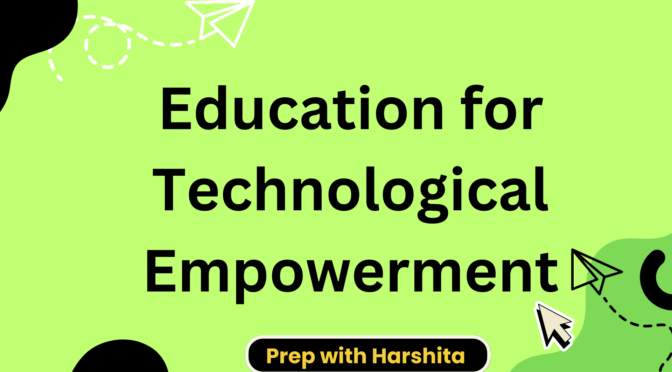Education for technological empowerment refers to the process of providing individuals with the knowledge, skills, and mindset necessary to effectively and responsibly utilize technology for personal and societal development. It encompasses a wide range of areas, including digital literacy, technical skills, critical thinking, ethical considerations, and innovation.
Here is a more detailed explanation of education for technological empowerment:
- Digital Literacy: Digital literacy is the foundation of technological empowerment. It involves developing the skills to use digital devices, navigate online platforms, and understand basic digital tools and concepts. Digital literacy enables individuals to access information, communicate, and participate in the digital world effectively.
- Technical Skills: Education for technological empowerment focuses on developing technical skills that are relevant to the digital age. This includes skills such as coding, programming, data analysis, cybersecurity, and information technology. These technical skills enable individuals to leverage technology for problem-solving, innovation, and productivity.
- Critical Thinking and Problem-Solving: Technological empowerment involves nurturing critical thinking and problem-solving abilities. Education encourages individuals to analyze information, evaluate the reliability of sources, and think critically about the ethical and societal implications of technology. It enables them to make informed decisions, solve complex problems, and adapt to technological advancements.
- Ethical Considerations: Education for technological empowerment emphasizes ethical considerations related to technology. It raises awareness about responsible digital citizenship, privacy concerns, online safety, and the ethical use of technology. By understanding and adhering to ethical principles, individuals can use technology in ways that benefit society and respect the rights and well-being of others.
- Innovation and Creativity: Education fosters an environment that encourages innovation and creativity. It promotes an entrepreneurial mindset, where individuals are encouraged to explore new ideas, develop innovative solutions, and leverage technology to create positive change. Education provides the tools and mindset necessary to harness technology as a tool for innovation and creative expression.
- Access and Inclusion: Education for technological empowerment aims to bridge the digital divide by ensuring equal access to technology and digital resources. It recognizes the importance of providing opportunities for all individuals, regardless of their socio-economic background or geographical location, to acquire the skills and knowledge needed to thrive in the digital era.
- Lifelong Learning: Technological empowerment is an ongoing process that requires individuals to engage in lifelong learning. Education instills a love for learning, encourages individuals to stay updated with technological advancements, and equips them with the skills to adapt and embrace new technologies throughout their lives.
In summary, education for technological empowerment equips individuals with the necessary skills, knowledge, and mindset to effectively and responsibly navigate the digital world, utilize technology for personal and professional growth, and contribute positively to society. It fosters digital literacy, technical skills, critical thinking, ethical considerations, innovation, and lifelong learning, enabling individuals to harness the power of technology for their empowerment and societal advancement.
Also Read: Culture and Education

Also Visit: Prep with Harshita

